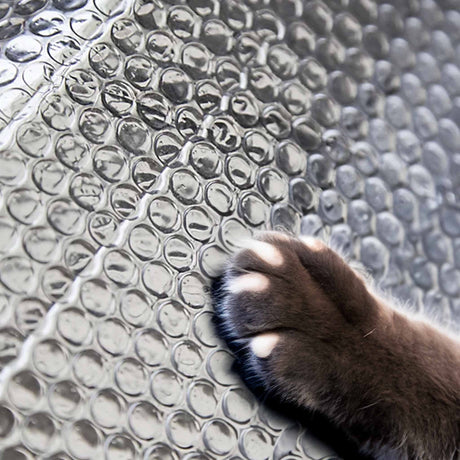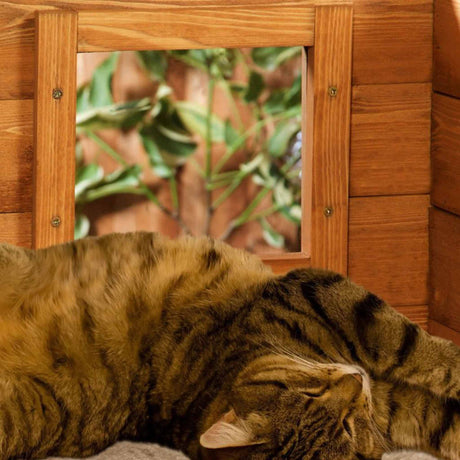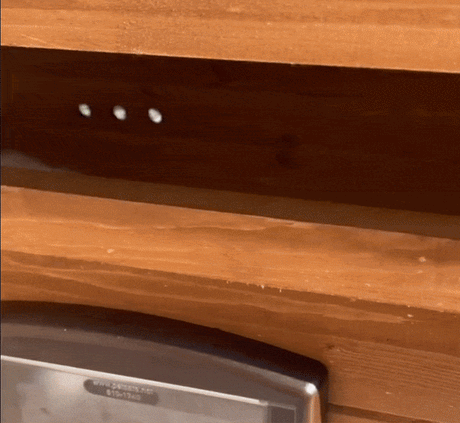What Are Your Options?
As a cat parent, you have three possible options when it comes to holidays and your cat. You can:
- Take your cat with you.
- Leave it at home with a pet sitter.
- Book your cat in at a cattery.
Each one has its own pros and cons that you need to consider. In the end, the one you choose will depend very much on your cat's personality, where you are going and also how long you are going to be away. Let's take a look at each one in a bit more detail.
Taking Your Cat on Holiday With You
You might be driving across the country to visit family for the week, popping into the next village for an overnight stay or jetting off to some exotic destination. Whatever you're doing, and wherever you're going, taking your cat with you is possible.
Cat carriers for cars and planes as well as pet-friendly accommodation and pet passports make travelling with your cat over Christmas easy and convenient. Remember, however, preparation is key for a stress-free trip and relaxing holiday.
What You Need to Know About Taking Your Cat on Holiday With You
If you're travelling with your cat over Christmas, this is what you need to know.
Cars, trains or aeroplanes
If you're staying local this year like so many other families, the good news is cats can travel with you as long as they have been microchipped and your accommodation is pet-friendly.
If you're visiting family in or around Europe, you can also take your cat if it is microchipped, has all its vaccinations and a valid pet passport. This document contains the most up-to-date information regarding your dog or cat's health, recent treatments and vaccinations. Your vet should be able to provide you with a pet passport. If not, they will be able to recommend one that can.
If you're flying to your holiday destination, you will need to let the airline carrier know that you'll be bringing your cat along. They will also be able to advise what else you will need to get your cat through the airport, quickly and safely.

Of course, if you're travelling by car, planning the actual trip might be a little easier. But for your cat's safety, and your peace of mind, we recommend a good-sized carrier that attaches to the seat belt. For added comfort, especially during the cold months, it's definitely worth adding self-heating bedding to keep your feline warm and cosy.
Don't forget to keep food, fresh water, bowls and treats handy for the car journey. A happy cat in the car means a stress-free trip for everyone.
Have you remembered the litter box for the car? You can either place a litter box inside the carrier, allowing your kitty to answer the call of nature. Or, if your cat is really particular with its toilet habits (and which cat isn't?), you could have a separate carrier with a litter box. If you go with this option, remember to stop every few hours for a toilet break.
On the topic of toilet breaks, pack plenty of plastic bags, a poop scoop and a pet-friendly disinfectant.
It's always a good idea to have a check-up with the vet to make sure your cat is healthy and well to travel. Depending on how your cat does with motion sickness or stress, you might want to ask about suitable medication for the journey.
Talking about medication, if your vet prescribes a new sedative or calming medication for your cat, it's essential to know how long the effects will last and whether there will be any side-effects. It's worth trialling it before the trip. This will eliminate any mishaps or panic situations for you and your pet.
Although this might make going away tough, if your cat doesn't do well on long journeys or gets anxious when it's in a new environment, it may be better leaving it at home with a trusted sitter or at a cattery.
Home away from home
If you're planning on staying with friends or family over the Christmas holidays, remember to ask if it's okay to bring your cat with. It's also worth confirming whether there will be other pets in the house. If so, find out if they're comfortable cats. Keep your cat in mind too. How happy is it around other animals? Sometimes the more isn't necessarily, the merrier.
When booking your stay at a B&B or other paid-for accommodation, as already mentioned you should make sure it is pet-friendly. Ask for personal recommendations from people you know, or look at online reviews.
Even if the accommodation is happy to have pets, you should still check what kind of facilities are available for your cat. This includes a safe and secure outdoor space.
If yours is an indoor kitty, it's best to find accommodation that is comfortable and secure for travelling cat-panion.
Everyone likes their home comforts when they're away, and this includes your cat. Remember to pack toys, stress relievers, scratch-posts, favourite cuddle buddies and beds to help your cat settle into its new surroundings quickly and happily.

Unless you're familiar with the place you're going, it's a good idea to pack all your cat's essentials for the first few days. This will give you a chance to settle in without worrying about where to buy all the essentials. Think food, bowls, clean water, litter trays or boxes, litter and of course, plenty of treats.
You have reached your destination.
Once you have arrived at your holiday destination, there's still some work that needs to be done to make sure your cat is holiday-ready.
If you have travelled abroad, there is a chance your cat may need to be kept in quarantine for a short period. Hopefully, you will have factored this into your holiday plans, so you're not caught out unawares.
If quarantining isn't an option, you could look into The Pet Travel Scheme or PETS. This allows people to travel with their pets to certain countries without having to quarantine them on arrival and when returning to the UK. As you can imagine, this makes travel a whole lot easier and less stressful for both you and your pet.
However, before you make use of this scheme, you must check your, and your pet's, eligibility.
Unlike humans who want to explore their new environment as soon as possible, your pet will need time to adjust. We suggest leaving your cat in its carrier while you unload the car or unpack your bags. Make sure there isn't too much noise around, and keep doors and windows closed. Let your cat come out of the carrier when it's ready and slowly explore the different rooms.
Lay down the rules with the family and explain the no-go zones for your cat. Always make sure windows and doors are closed, so there is no chance of escape. Something definitely worth remembering is to keep the room at a comfortable temperature for your cat.
Don't forget about Brexit
As it currently stands, government guidelines state that any arrangements for travelling with your pet need to be in place at least four months before you leave. You should also make sure you have completed the following essential steps:
- If your cat isn't yet microchipped, be sure to get it done.
- Check that your pet's rabies vaccinations are up-to-date.
- If your cat requires a rabies vaccination, you will need to see the vet 30 days after the injection to check the test has worked. This follow-up includes a blood test.
- If the blood test shows the vaccination has been successful, you will still need to wait three months before you are allowed to travel.
- Make sure you visit the vet 10 days before your trip to get an animal health certificate (AHC) for your cat. This should include information regarding the date your cat was microchipped, vaccination history and the rabies antibody blood test.
If you still plan on travelling with your pet, you must stay up to date with government guidelines via websites like GOV.UK.
Deciding To Leave Your Cat At Home
With these possible changes in regulations coming into place, it could make travel with your pet a little more complicated, which means a lot of people will choose to leave their cats at home over the holiday. As difficult as this decision might be for you, it might not necessarily be the worst thing for your kitty.

Remember, unlike dogs that can quickly adapt to new environments, cats are more often creatures of habit. This means they don't like a sudden change in their routine or finding themselves in strange settings. If this sounds like a feline you know, it might be a good idea to leave your cat in the safety of its own house, or a cattery.
Keep in mind; however, you will still need to plan for this while you are away. Let's take a look at how best you can do this, so you don't spend your holiday worrying, and your cat isn't left feeling abandoned or alone.
Option 1 - Cat sitter
Cat sitters usually come to your house once or twice a day to feed your cat, top up its water bowl and spend some time playing with it. But not all cat sitters are created equal. Before you trust your precious pets with somebody, you need to make sure they are reliable, responsible and genuinely care about animals.
Looking for a reputable pet-sitting service online is the first step. However, ask people you know for personal recommendations of sitters they use, and request references from previous clients. Oh, and remember this person will have access to your house while you are away, so the person you choose must have a current DBS check.
Option 2 - Live-in sitter
If you have decided to leave the cat at home for the holidays, you could get a live-in cat sitter. This is a good option if your pet has special needs, is old or ill. And if your cat has a medical condition that requires monitoring or administering of medication, this is definitely the way to go.
In our experience, a live-in sitter doesn't cost much more than a sitter that pops in once or twice a day, and for absolute peace of mind that your kitty is well taken care of, we think it's well worth the money. Remember to ask for recommendations from people you trust, as well as contactable references and a DBS check from the sitter.
Option 3 - Friends or family
If budget is a concern, or you don't like the idea of a stranger in your home and around your pets, you could ask a friend or family member to help. If they live nearby, they could pop by your house in the mornings and afternoons to spend some time with your cat, feed it and clean out the litter box. Or if it's more convenient, you could have them stay over the whole time you're on holiday.
Option 4 - Cattery
We get that it's not always possible to leave your cat at home when you travel, which is why we've included a cattery as a viable option. Of course, being away from its home, around strangers and other animals might not suit your kitty, so depending on your pet's personality, this might be your last resort. Having said that, there are fantastic boarding kennels for cats, so don't stress too much if this is your only choice.
Choosing a cattery is going to take some time and effort on your part. After all, this is your precious pet. Take a look at how to find the best one for your, and your cat's needs.
- Always ask for recommendations from people who have experience with the cattery. It's not going to be much of a holiday if you spend the entire time stressing about your cat.
- Visit the cattery before you book a place for your cat. What you see on the web isn't always what you get.
- Speak to the staff that will be caring for your cat. Ask as many questions as you like and even pose a few hypothetical scenarios. Their answers will tell you a lot about the kind of care your pet will be receiving.
- Remember to always trust your instincts. If you're not getting a good feeling about the cattery, it's best to continue your search.
Still not sure which option is best for your cat? Why not take a look at our article about cat sitting and catteries?
Remember, at the end of the day, whether you take your kitty home for Christmas or leave it with a trusted pet sitter or in a cattery, your decision must be made with your cat in mind.
We'd like to take the opportunity to wish you and yours a paw-some Christmas and a furry happy new year!








